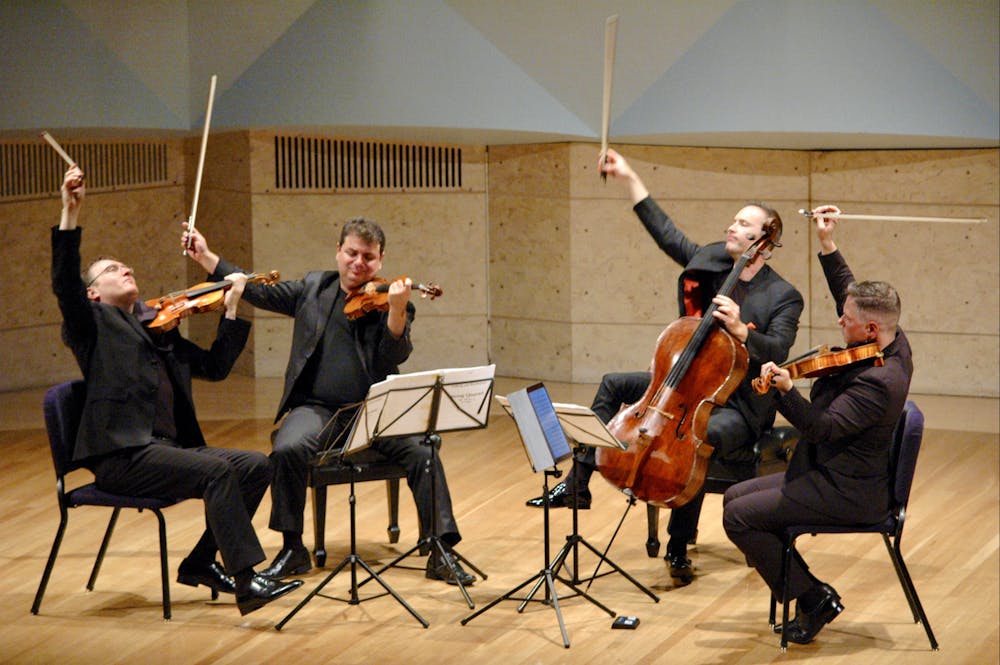On Nov. 2, the Jerusalem Quartet flooded the Mahaney Arts Center with passionate string music ranging from classical to modern. Celebrating their 30th season, Jerusalem Quartet returned to Middlebury with a program of Haydn, Shostakovich and Dvorák.
The Jerusalem Quartet is a regular performer on stages across the world. The group is composed of four distinguished and accomplished artists: Alexander Pavlovsky (Violin), Sergei Bresler (Violin), Ori Kam (Viola) and Kyril Zlotnikov (Cello). The Jerusalem Quartet has redefined the tradition of string chamber music with their humanistic core and balance between high and low tones. They have recorded string quartets from music masters like Schubert, Ravel and Debussy. Their recordings have received numerous awards including the Diapason d’Or and the BBC Music Magazine Award for Chamber Music.
Haydn’s “Quartet in B-flat Major, Op. 50, No. 1/ Hob.III:44 (‘Prussian’)” was the first composition of the performance. In early 1780, Wolfgang Mozart and Franz Haydn started a conversation in which notes became words. The two extraordinary musicians expressed their admiration for each other using quartets.
“I think Haydn is our most famous underappreciated composer,” Professor Emeritus of Music Larry Hamberlin said in a lecture before the concert. “The thing about Haydn’s music is that it is comedy. If you think that there are things that can be said in comedy that are hard you talk about in other ways, then maybe it’s possible that something that makes you laugh can also make you think. Maybe even makes you feel it. And I think Haydn’s music does all those things.”
The Jerusalem Quartet sounded playful and vivacious as they incorporated four movements of this quartet into their performance — as if the four players were having a thought-provoking and funny conversation.
“String Quartet No. 12 in D-flat Major, Op. 133” by Dmitri Shostakovich, the second composition of the performance, is a testament to hope and strength. Suffering from illness, Shostakovich used his every breath to write this piece which features a 12-tone system that has no center and no rest.
“Just like Haydn has serious things to say in comic music, Shostakovich has rather light things to say in the serious, tragic music,” Hamberlin said.
“The short notes created a kind of bouncy effect, and it felt like it was in the middle of sad and happy feelings,” agreed concert attendee Youyou Zhang ’28.
The third composition of the performance, “String Quartet No. 13 in G Major, Op. 106,” furthers the program’s bittersweet combinations. Written by Antonin Dvořák, the piece layers excitement with melancholy.
“Haydn writes his quartets for the four players to have a conversation. Shostakovich was writing for the four members of that specific quartet. Dvořák, in contrast, is just writing a big, beautiful piece of music that he wants lots of people to listen to and enjoy,” Hamberlin noted.
There were lots of nodding heads and bouncing fingers when the Jerusalem Quartet was playing this piece — it was an undeniable crowd pleaser.
“I was sitting on the first row so I could sense the interflow [of the quartet],” Zhang said. “The cello player [Kyril Zlotnikov] was making eye contact with every player in and between the movements: he was almost like the leader. The first violinist [Alexander Pavlovsky] was so passionate that he almost stood up in the third piece, which was my favorite piece in the show.”
Allison Coyne Carroll, Performing Arts Series director, shared some thoughts on why the performers chose these three works to be played.
“As a programmer, I am often offered a small menu of options for the artists to perform so they can play similar programs and minimize the repertoire they need to carry on tour,” Coyne Carroll wrote in an email to The Campus. “For the Jerusalem Quartet, I could choose between two works after intermission: Mozart’s “Dissonance” or Dvořák’s G Major quartet. While Mozart is an interesting piece, I find the Dvořák to be a dynamic and compelling work — with a more complex harmonic structure for our theory classes to explore.”
Coyne Carroll also added that Dvořák’s quartet also has an American connection, as it was written during the composer’s years living in the U.S, which she thought would be a nice way to end the program in anticipation of the national election this week.
For Coyne Carroll, the Jerusalem Quartet was a welcome addition to the Performing Arts Series lineup.
“Saturday’s program explored some of the most important voices in chamber music, played impeccably by the Jerusalem Quartet—who are lauded for exhibiting depth, precision, and passion in their playing,” Coyne Carroll wrote. “Hosting their return to Middlebury—and to such a welcoming audience—was a thrill.”




